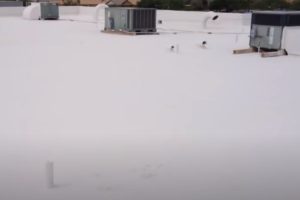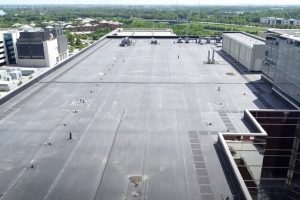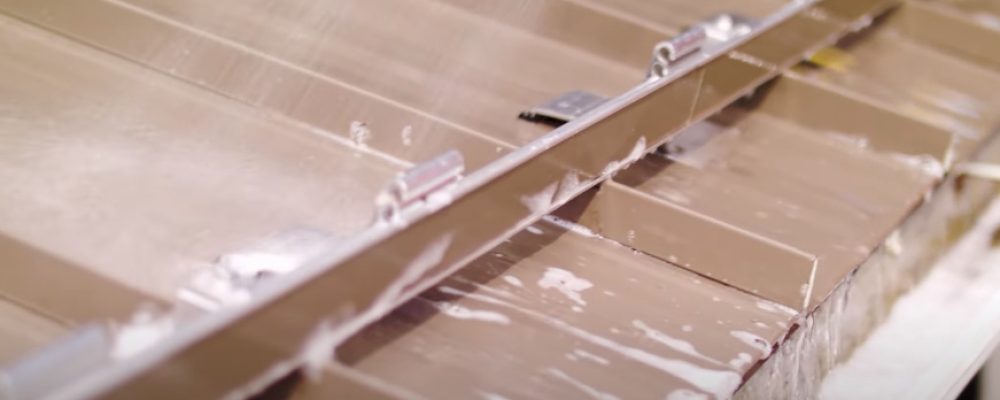Commercial Roofing Contractors in Grand Rapids
When it comes to your commercial property, the roof is more than just a covering – it’s a vital shield safeguarding your investment. That’s why choosing the right commercial roofing contractor in Grand Rapids is crucial. We’re a team of experienced professionals dedicated to providing comprehensive solutions for all your roofing needs, from repairs and maintenance to installations and replacements.
Get Free Estimate
Commercial Roofing Contractors in Grand Rapids
Keeping up with roof repairs is a key aspect of maintaining a commercial and business facility. It’s not just a matter of aesthetics but also of safety and protecting your investments. No matter what type of business you’re running, you’ll have employees and potentially customers in the building depending on the roof being in good shape. There are also potentially valuable equipment, goods and materials to protect. A damaged roof can let in water, wildlife and other elements of the outside world that can be detrimental to all aspects of your business.
Business owners in Grand Rapids have many commercial roofing contractors to choose from when looking for the right person to repair or replace their property’s roof. They have experience with the needs of business owners and the materials needed for a lasting fix or a significant building upgrade.
What Type of Roof is Best For My Building?
A high priority when selecting a roof for a new or existing building is making sure it is code-compliant. Grand Rapids property maintenance code requires that a roof be rain-proof and have adequate drainage to prevent water accumulation. Drains should also discharge water discreetly and without inconveniencing others.

Built-up-Roofing (BUR)
With this in mind, consider that the roofs of many commercial structures are flat rather than sloped. Built-up-roofing (BUR) membrane is a type of rubber poured in multiple layers and then dried. Once drying is complete, a layer of stones is added to provide protection from debris and weather. BUR roofs are relatively easy to install and cost-effective, which helps to keep your costs under control. Since they tend to be slippery when wet, they are an ideal choice for flat roofs where sloping is minimal.

Ethylene Propylene Diene Monomer (EPDM)
EPDM is another rubber-like material that works well for flat roofs while also being energy-efficient. Since it primarily needs to be kept clean in order to perform optimally, maintenance is simple. Metal roofing may not be the most aesthetically pleasing but it is long-lasting and highly resilient. It's also more costly than other roof types, but may be worth the investment for your business.

PVC
For roofs that experience prolonged and direct sun exposure, you may want to consider PVC or thermoplastic polyolefin. Both materials are highly heat-resistant and reflective, reducing both the temperature inside your building and energy costs.
If your roof is sloped and more visible to pedestrians and drivers, you may want to select a more aesthetically pleasing roofing material. This can also help to boost the profile of your business and fit with the image you want to establish.
Will My Business Need to Shut Down During the Roof Installation Process?
An understandable concern of any business owner is the possibility of having to halt business and potentially lose profits while a roof install is underway. However in many cases a business can stay open during the installation. The install can also be done one section at a time, so you only need to close off certain areas of the facility rather than shut it down entirely.
Certain types of materials are easier for roofing contractors to install without encroaching on areas inside the building. You may also have the option of scheduling the work to be done outside of normal business to minimize the impact of the project on customers and employees.
It’s also important to consider the effect the roof installation will have on the type of business you run. Certain aspects such as odors and noise could lead to negative customer experience and inconvenience, and it may be worth shutting down the business for a short time, at least during the most intensive parts of the installation, in order to avoid this outcome. Keeping up clear and open communication with your contractor helps ensure that your business is able to keep operating as close to normal as possible until your new roof is in place.
What Kind of Maintenance Will My New Roof Require?

Different types of roofs have varying requirements for maintenance. Metal roofs and PVC roofs usually just require periodic cleaning to remove natural or man-made debris. This can easily gather over time on flat roofs. Some flexible materials may expand and contract in high temperatures, leading to openings around fasteners, so regular inspections are essential. These inspections are also useful for finding tears or cracks as well as dents in metal or missing shingles.
A sloped roof generally requires less maintenance and a once-a-year cleaning suffices. Flat or slow sloped roofs need maintenance two to three times yearly, depending on their size and layout. Make sure that all drainage channels are clear and free of blockages that could impede water flow. Many of the same roofing contractors that install and repair roofs also offer roof maintenance services.
How Much Does a New Commercial Roof Cost in Grand Rapids?
Any of the numerous commercial roofing contractors in Grand Rapids can work with you to develop a quote based on your needs and your existing building. The cost of the roof installation will depend on the size of the roof, the material used and the demand at the time of year the install is scheduled. Large commercial projects also often require more labor to complete, especially on a tight timeline.
Depending on the material, size of the job and the season, a commercial roof replacement could potentially run into the tens or even hundreds of thousands of dollars. It’s advisable to get multiple quotes and see what different contractors offer, both to get a baseline cost and to make sure you are getting your money’s worth. Opting for top-notch commercial roofing in Grand Rapids ensures that your investment withstands the test of time and the unpredictable weather patterns of the region. Whether you operate a retail space, office building, or industrial facility, a new roof is an important component of your business infrastructure, offering peace of mind and long-term value for decades to come.
LICENSED, BONDED AND INSURED FOR YOUR PROTECTION
- Decades of installer Experience
- First in class service
- Industry Standard Products & Materials
- Courteous, Friendly, Professional
- Clean Job sites
- Fast Project Turn Around






CONTACT US
Frequently Asked Questions
Metal roofs are generally considered the most energy-efficient option for homes. They reflect a high percentage of sunlight, keeping your attic cooler and reducing reliance on air conditioning in hot climates. They also last a long time and require minimal maintenance compared to other materials. However, keep in mind that metal roofs can be more expensive upfront than other options.
Yes, some commercial roofs can have shingles. Shingles are a popular choice for smaller commercial buildings or those on a budget. They offer an attractive, easy-to-install, and affordable option. However, they are not the most common roofing material for commercial buildings because they may not be as durable as other options like metal roofs, especially for large buildings with heavy equipment on the roof.
The gravel layer on commercial roofs, also called ballast, serves several key purposes. Its weight holds down the roof membrane, especially in windy areas, preventing it from flapping or blowing off. Gravel also acts like a shield, protecting the roof from harsh sun rays that can degrade the membrane over time. It even provides some insulation, keeping the building cooler in summer and reducing energy costs. So, that seemingly simple layer of gravel plays a big role in keeping commercial roofs functional and lasting longer.
The life expectancy of a commercial roof varies greatly depending on factors like the type of roofing material, quality of installation, the local climate, and how well the roof is maintained. Here’s a general idea:
- Metal Roofs: 30-45 years
- TPO & PVC: 20-30 years
- Built-Up Roofs (BUR): 20-40 years
- Modified Bitumen: 10-20 years
Regular inspections and proper maintenance can significantly extend your roof’s lifespan.
The amount of weight a commercial roof can hold varies greatly depending on the building’s design, materials, and local building codes. A minimum standard is that it should support a 300lb concentrated load (like an HVAC unit) over a 2.5 x 2.5 ft space. It’s crucial to consult with a structural engineer or roofing professional to determine your specific roof’s weight capacity. They can consider factors like roof type, age, condition, and any additional loads you plan to add (solar panels, rooftop garden, etc.).
Commercial buildings often have flat roofs for several reasons. Primarily, they are more cost-effective to construct than pitched roofs, especially for large buildings. Flat roofs also maximize usable space, both on the roof itself for equipment like HVAC units and solar panels, and within the building by avoiding the interior space reduction created by sloped ceilings. Additionally, flat roofs tend to be easier and safer to access for maintenance.
There’s no single “best” roof for every commercial building. The ideal choice depends on several factors including your budget, the building’s function, local climate, and desired lifespan. Popular commercial roofing options include metal roofs (known for durability), single-ply membranes like TPO and PVC (lightweight and reflective), modified bitumen (affordable and leak-resistant), and built-up roofing (BUR) for traditional, multi-layered protection.
